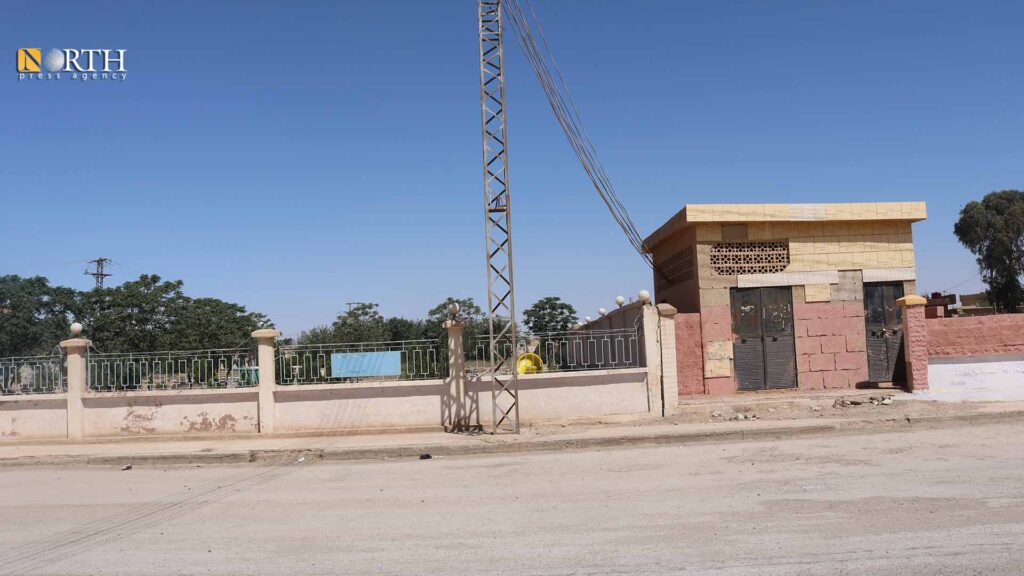SHADDADI, Syria (North Press) – “I cannot forget that day,” said Muhammad Suleiman, a resident of Shaddadi, a town in south of Hasakah, north Syria, recalling what he was forced to witness in front the old municipality building’s yard, once was a place for public executions by the Islamic State Organization (ISIS).
The man recounts to North Press the details of that day when ISIS militants forced him and over 200 other individuals to gather in that square.
That was a month after ISIS took control of the town, its members spread and brought a blindfolded and handcuffed man in his thirties, put him in the middle of the square and shot him with live bullets, shouting “Allahu Akbar” [God is The Greatest].
Recalling those moments, the man said, “I cannot describe how I felt at the time. I was terrified due to the brutality of the sight.”
From that moment until ISIS was expelled from the town, Suleiman avoided passing through that place.
He said, “The smell of death reeked of it every day.”
In February 2013, following fierce battles between the Syrian government forces on the one hand and the Syrian armed opposition factions and Hayat Tahrir al-Sham (HTS, formerly al-Nusra Front) on the other, the government withdrew from Shaddadi.
As a result, infrastructure was devastated and the government facilities were looted.
A year later, ISIS attacked Shaddadi, resulting in fierce fighting between ISIS and the opposition factions, which lasted for days to end up with ISIS taking control over the town.
In 2016, the Syrian Democratic Forces (SDF) managed to take control over Shaddadi.

Horrible place
During the ISIS control of Shaddadi, the square of the old municipality in the town became a place to implement death sentences.
People, who were accused of infidelity and apostasy, were beheaded, shot, or bludgeoned to death in the square, as militants used to hang their bodies, or their heads on electricity poles.
At the time, ISIS turned the municipality building to a headquarters under the name of the Islamic Court.
Residents described the square as one of the most terrifying places in Shaddadi, due to the scenes of terrible savagery, and the hanging bodies on the electricity poles.
According to residents of Shaddadi, ISIS was deliberately carrying out public executions in the squares, aiming at spreading fear and terror and warning the residents against the fate of those conspire against the organization.
ISIS members used to force the residents in markets to gather to witness these public executions.
After ISIS era, the Islamic Court center has been transformed into a center where Society Protection forces are stationed, as well as a small park was built near it for civil council institutions, in which poetry recitals and celebrations are held.
The Society Protection forces is a local armed group affiliated with the Internal Security Forces of North and East Syria (Asayish). It consists of members of society with the aim of protecting their neighborhoods, villages and towns along with other armed groups within the Autonomous Administration of North and East Syria (AANES) areas.
Unforgettable scenes
In the middle of the main street in Shaddadi, the ISIS used to show its battles with the Iraqi army forces, the Syrian government forces and the SDF, on a large television screen.
Residents used to wake up at the sights of either heads hanging in the square, or bodies of executed people hanged on electricity poles.
Near the corpses and sometimes directly on them, ISIS fighters used to write a description of the crime that led to the execution.
The 38-year old Abd al-Mousa, resident of Shaddadi, narrates to North Press the day he passed by the square, and saw a body of a young man hanging on an electricity pole.
“At the time, I was stunned and terrified. This was one of the harshest scenes I have ever seen in my life,” al-Musa said.
He pointed out that there was a small piece of paper on the young man’s head that read “killer”.
After that incident, al-Musa said that he was trying as much as possible not to allow his wife and children to leave the house or go to the markets, so that they would not witness the crimes of ISIS and the terrifying scenes.
“Those dark times that I witnessed, are still engraved in my memory,” he said.

